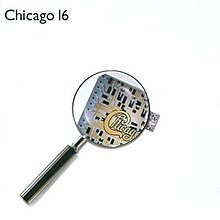This article needs additional citations for verification. (January 2015) |
| Chicago 16 | ||||
|---|---|---|---|---|
 | ||||
| Studio album by | ||||
| Released | June 7, 1982 | |||
| Recorded | January–April 1982 | |||
| Studio | Bill Schnee Studios (Los Angeles, CA) The Record Plant (Los Angeles, CA) Davlen Sound Studios (Hollywood, CA) Skyline Recording (Topanga, CA) | |||
| Genre | Rock | |||
| Length | 41:51 | |||
| Label | Full Moon/Warner Bros. | |||
| Producer | David Foster | |||
| Chicago chronology | ||||
| ||||
| Singles from Chicago 16 | ||||
| ||||
| Review scores | |
|---|---|
| Source | Rating |
| AllMusic | |
Chicago 16 is the thirteenth studio album by the American rock band Chicago, released on June 7, 1982. It is considered their "comeback" album because it was their first album to go platinum since 1978's Hot Streets.[2] It made it into the Billboard 200 top ten,[3] and produced their second number one single in the United States, "Hard to Say I'm Sorry".[4]: 202 The album was certified gold by the Recording Industry Association of America (RIAA) in August, 1982, two months after its release, and platinum in December, 1982.[5] "Hard to Say I'm Sorry" was nominated for a Grammy Award for Best Pop Performance by a Duo or Group with Vocal.[6]
Chicago 16 was the first album in a decade-long association with their new label Warner Bros. Records;[7] the band's first project to be produced by David Foster, who has been called the "key" to their comeback;[7] their first album to include some songs exclusively by composers outside of the group;[8] and is also the first album since Chicago VII (1974) not to feature Laudir de Oliveira as a band member.[4]: 132, 200 It is also the first studio album to be released two years after the previous, as previous studio albums were released annually.
- ^ Chicago 16 at AllMusic. Retrieved January 12, 2015.
- ^ Grein, Paul (January 15, 1983). "'Firsts' Spark Platinum Albums". Billboard. Vol. 95, no. 2. USA: Billboard Publications, Inc. p. 4. Retrieved July 28, 2017 – via Google Books.
- ^ Grein, Paul (January 5, 1985). "Chart Beat". Billboard. Vol. 97, no. 1. USA: Billboard Publications, Inc. p. 6. Retrieved July 28, 2017 – via Google Books.
- ^ a b Seraphine, Danny (2011). Street Player: My Chicago Story. John Wiley & Sons, Inc. ISBN 978-0-470-41683-9.
- ^ "Gold & Platinum - RIAA:Chicago:Chicago 16". RIAA. Retrieved July 26, 2017.
- ^ "Chicago". GRAMMY.com. 2017-05-14. Retrieved 2017-07-23.
- ^ a b Grein, Paul (January 26, 1985). "Record of the Year: Chicago Sustaining Comeback Momentum". Billboard. Vol. 97, no. 4. New York, NY: Billboard Publications, Inc. pp. 6, 79. Retrieved July 23, 2017 – via Google Books.
- ^ Van Matre, Lynn (June 13, 1982). "Revitalized Chicago Back On Road Again". Chicago Tribune. Retrieved July 26, 2017.